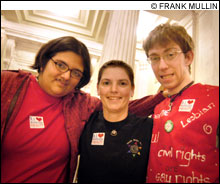 Justice Brown-Duso is an outspoken nine-year-old with a big smile. He knows what his name means, and he is quick to criticize injustice when he sees it. “He gets really indignant,” says his mom, Michelle Duso. “Like, ‘What do you mean a mom and dad family is better than my mom and mom family?’ ” In 1998, when Duso, the executive director of the Providence nonprofit Youth Pride, and her partner, Julie Brown, went before a judge to adopt Justice, they were essentially asking the same question.
Justice Brown-Duso is an outspoken nine-year-old with a big smile. He knows what his name means, and he is quick to criticize injustice when he sees it. “He gets really indignant,” says his mom, Michelle Duso. “Like, ‘What do you mean a mom and dad family is better than my mom and mom family?’ ” In 1998, when Duso, the executive director of the Providence nonprofit Youth Pride, and her partner, Julie Brown, went before a judge to adopt Justice, they were essentially asking the same question.
The two women went through the entire process together, insisting, recalls Duso, that they would not start “our family based on lies and shame and loopholes.” Despite this, Brown ultimately wound up stepping aside to allow Duso to file an individual petition for adoption. Told that the adoption was unlikely to be granted if they petitioned together, the couple decided it was more important to have Justice in their home than to start a court fight. A few years later, though, in 2002, Duso and Brown were able to jointly adopt their second son, Dylan, now five, and then his brother, Corey, now four.
The friendlier stance of Rhode Island courts toward gay and lesbian parents is just one sign of how things are steadily improving, locally and nationally, for lesbian, gay, bisexual, transgendered, and queer (LGBTQ) people. The changes can be seen in such disparate events as the mainstream success of Brokeback Mountain, a string of legislative victories in Rhode Island, and how David N. Cicilline’s status as an openly gay man proved a non-issue in the 2002 Providence mayoral election. As Rodney P. Davis, president of Rhode Island Pride, which runs the annual Pride Parade in Providence and other events, puts it, “Individuals feel comfortable to be who they are in places where 10, 15, 30 years ago that wouldn’t have been imaginable.”
Stephen Hartley, director of development at AIDS Care Ocean State, agrees. “People are finally coming around,” he says. Hartley, a Johnston native who is well known in the LGBTQ community through his alter ego, drag queen Miss Kitty Litter, says the scene is far less furtive than when he came out in the 1970s. “I have been dressed in drag in every bar, every restaurant in downtown Providence,” he says. “It astounds me how many people in Rhode Island know me. The governor of Rhode Island knows Kitty Litter.”
But despite considerable progress, Rhode Island still lacks a formal community infrastructure, beyond nightspots, for gays and lesbians. There are only two organizations — RI Pride, and Youth Pride, which provides support, advocacy, and education for youth — with their own offices and paid staff. More fundamentally, the ongoing legal inability of gays and lesbians to marry here shows how a central social convention — and all that it conveys — remains out of reach.